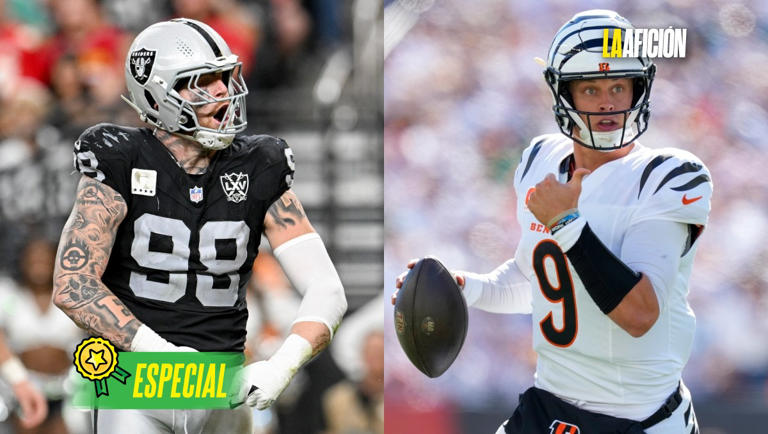### Maxx Crosby Fined for Late Hit on Joe Burrow: A Price of Aggression in the NFL
In the high-speed, high-intensity world of the NFL, players are often pushed to the limits of their physical and mental endurance. The game is relentless, and the margin for error is razor-thin. Every play matters, and every hit is scrutinized. Recently, Maxx Crosby, the Oakland Raiders’ star defensive end, found himself at the center of controversy after being fined $11,255 for a late hit on Cincinnati Bengals quarterback Joe Burrow. The incident, which took place during a key moment in a tense matchup, not only sparked debates about player safety but also underscored the fine line between aggressive play and unnecessary roughness.
### The Incident: A Late Hit on Burrow
The hit occurred during the second quarter of the game between the Raiders and Bengals. Burrow, dropping back to pass, had already released the ball when Crosby, charging through the Bengals’ offensive line, lunged toward the quarterback. Burrow had already completed the throw, and Crosby, unable to fully halt his momentum, collided with the quarterback well after the ball was gone.
Though Crosby appeared to attempt to minimize the impact, the timing of the hit was undeniable: it was late, and it drew an immediate penalty flag. Referees called a personal foul for unnecessary roughness, signaling that Crosby had made contact with Burrow after the play was dead. While the hit itself wasn’t malicious or aimed at causing injury, the timing and force were deemed excessive under the league’s rules regarding quarterback protection.
As part of the NFL’s ongoing efforts to protect players, particularly quarterbacks, from unnecessary harm, the league swiftly imposed a fine on Crosby for his actions. The fine—$11,255—was a reflection of the severity of the infraction, which was deemed a violation of the league’s safety protocols. While the fine itself might seem modest in comparison to the multi-million dollar contracts many players sign, it serves as a stark reminder of the NFL’s commitment to maintaining a balance between fierce competition and player safety.
### The Fine and the NFL’s Tough Stance on Quarterback Protection
Crosby’s fine was not an isolated case; it was part of the NFL’s broader effort to enforce rules designed to safeguard quarterbacks. Over the past decade, the league has implemented several rule changes aimed at reducing the risk of injury to quarterbacks, who are often viewed as the face of a franchise and are typically more vulnerable to hard hits due to the nature of the position.
The league’s most notable rule in this regard is the “Brady Rule,” named after New England Patriots quarterback Tom Brady. This rule, which came into effect in 2009, prohibits defenders from hitting a quarterback below the knees or with excessive force after a pass is thrown. Over time, the rules have evolved to protect quarterbacks even more stringently, with the league taking an increasingly firm stance on late hits and unnecessary roughness in situations involving quarterbacks.
Crosby, a player known for his aggressive style of play, has been a dominant force for the Raiders’ defense. His relentless pursuit of quarterbacks and his ability to disrupt offensive schemes has earned him respect across the league. However, even the most aggressive pass rushers must be mindful of the league’s growing emphasis on player safety. The NFL has made it clear that players are expected to show restraint when it comes to hits on quarterbacks—especially after the ball has been released.
### The Impact of the Fine on Crosby and the Raiders
For Crosby, the fine serves as both a financial penalty and a reminder of the challenges that come with playing in the NFL’s hyper-competitive environment. While $11,255 may seem like a drop in the bucket for a player of Crosby’s caliber, the penalty is part of a broader system that holds players accountable for actions deemed to endanger the health of other players, even unintentionally.
Crosby, for his part, has always been known as a player who plays with a chip on his shoulder. His relentless energy and motor have made him one of the most feared pass rushers in the league. But his fine for the hit on Burrow reflects the evolving nature of the NFL’s disciplinary measures and the growing focus on the safety of its players.
The Raiders, too, feel the impact of Crosby’s actions. The team is working to balance its aggressive defense with the realities of the league’s rules. Coaches and staff will likely emphasize the importance of discipline and focus to Crosby and the rest of the defensive unit. Although Crosby’s fine was relatively small in the grand scheme of things, it serves as a cautionary tale for the entire team about the need to adjust to the NFL’s ever-evolving set of rules and regulations.
### A Broader Conversation About Safety and Aggression
The fine on Crosby also raises larger questions about the balance between maintaining the physicality of the NFL while ensuring player safety. The league has been under increasing scrutiny in recent years, especially in light of the ongoing concerns about head injuries, concussions, and long-term health consequences for players. These concerns have led to significant changes in how the game is played, including stricter penalties for late hits and unnecessary roughness, as well as increased emphasis on concussion protocols.
For fans and analysts, the fine on Crosby represents the league’s commitment to reducing the risk of injury, particularly to its quarterbacks. Yet, it also highlights the inherent tension in a sport where violence is part of the game. Pass rushers like Crosby are trained to be aggressive, to get to the quarterback as quickly as possible, and to disrupt the offense in any way they can. But the rules now demand that they do so with greater care, especially when it comes to hitting the quarterback after the play is already over.
In many ways, Crosby’s fine is a reflection of the NFL’s difficult balancing act—preserving the physical, hard-hitting nature of the game while also addressing the growing concerns over player health. It’s a fine line, and one that will continue to shape the league’s decisions and policies for years to come.
### Conclusion: The Cost of Aggression
Maxx Crosby’s $11,255 fine for his late hit on Joe Burrow serves as a reminder of the high stakes in the NFL, where every play is scrutinized and every decision has consequences. For Crosby, it was a hard lesson in the evolving nature of the league’s emphasis on player safety, especially when it comes to protecting quarterbacks. While his aggressive style of play is a hallmark of his success, the fine is a clear signal that in the modern NFL, even the most powerful and skilled players must learn to adjust their tactics in the face of changing rules. For the Raiders, it’s another lesson in the complex dynamics of the NFL, where physicality, precision, and discipline must coexist in the pursuit of victory.


